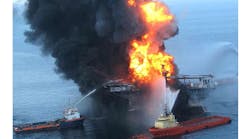U.S. District Court Judge Sarah Vance has approved a $4 billion dollar settlement between BP Exploration and Production Inc. and the U.S. Department of Justice related to the Deepwater Horizon tragedy and its cleanup, in which the company will plead guilty to 11 felony counts of Misconduct or Neglect of Ships Officers relating to the loss of 11 lives; one misdemeanor count under the Clean Water Act; one misdemeanor count under the Migratory Bird Treaty Act; and one felony count of obstruction of Congress. The federal government and BP reached the settlement in November 2012, but have been waiting for Judge Vance to approve it.
Neither DOJ nor BP presented arguments to the court before Vance made her ruling. She listened to testimony from the family members of the 11 workers who died in the explosion of the Deepwater Horizon drilling rig on April 20, 2010. Calling the settlement “just,” Vance said the statements made by the families of the victims were “gut-wrenching.”
Although BP executives have issued statements stating they “deeply regret the tragic loss of life” and have apologized for the company’s role in the tragedy, Vance told family members they deserved personal apologies from BP executives.
“I think BP should have done that out of basic humanity,” said Vance.
DOJ also has issued a 23-count indictment charging BP’s two highest-ranking supervisors onboard the Deepwater Horizon – Robert Kaluza and Donald Vidrine – with manslaughter and violation of the Clean Water Act. The indictment charges the two BP well site leaders with negligence, and gross-negligence, on the evening of April 20, 2010.
“In the face of glaring red flags indicating that the well was not secure, both men allegedly failed to take appropriate action to prevent the blowout,” said Assistant Attorney General Lanny A. Breuer.
A separate indictment charged a former senior BP executive, David Rainey, with obstructing a congressional investigation and making false statements to law enforcement officials. The indictment alleges that Rainey, on behalf of BP, intentionally underestimated the amount of oil flowing from the Macondo well. Rainey allegedly cherry-picked pages from documents, withheld other documents altogether and lied to Congress and others in order to make the spill appear less catastrophic than it was.
Kurt Mix, a former BP engineer, was arrested in April 2012 on charges of intentionally destroying evidence requested by federal criminal authorities investigating the Deepwater Horizon disaster. Mix was charged with two counts of obstruction of justice in a criminal complaint filed in the Eastern District of Louisiana.
“The explosion of the rig was a disaster that resulted from BP’s culture of privileging profit over prudence,” said Breuer. “We hope that BP's acknowledgment of its misconduct – through its agreement to plead guilty to 11 counts of felony manslaughter – brings some measure of justice to the family members of the people who died onboard the rig.”

